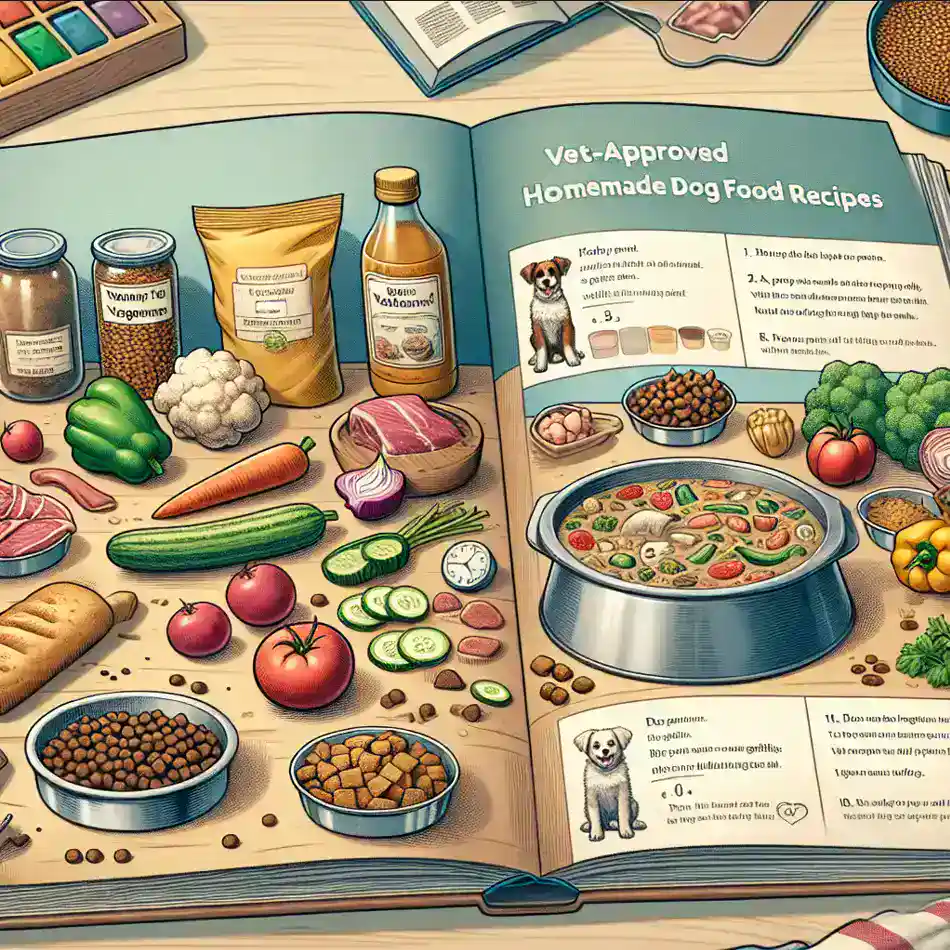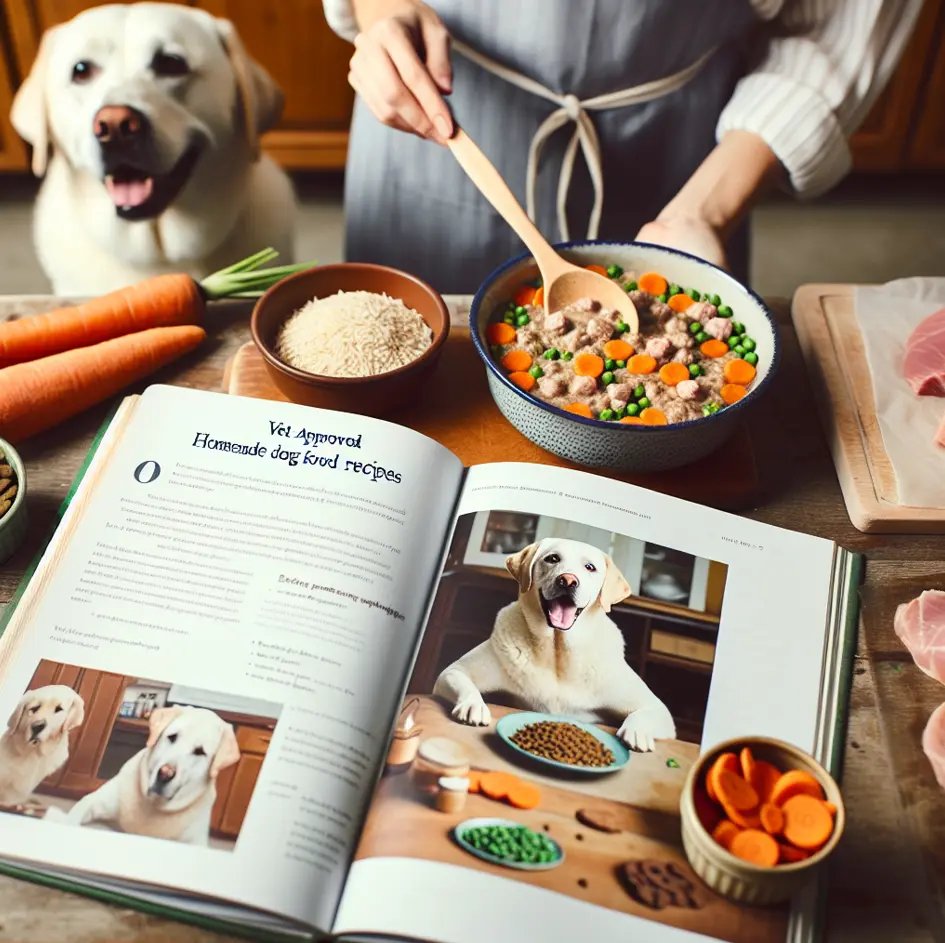Hello fellow dog lovers! If you’re like me, you want the very best for your furry friend, and that includes the food they eat. With the rise in awareness of what’s really in commercial dog foods, more pet parents are turning to homemade dog food recipes. Today, I’m excited to share with you some vet-approved homemade dog food recipes that are not only healthy but also delicious. These recipes ensure your dog gets all the necessary nutrients they need to thrive.
Why Consider Homemade Dog Food?
Before we jump into the recipes, let’s discuss why you might want to consider making homemade dog food:
- Control Over Ingredients: You know exactly what’s going into your dog’s bowl.
- Tailored Nutrition: You can adjust the ingredients based on your dog’s specific dietary needs.
- Freshness: Homemade food means fresher ingredients without preservatives.
- Bonding: Cooking for your dog can strengthen your bond as you cater specifically to their tastes and preferences.
Essential Nutrients for Dogs
When preparing homemade dog food, it’s crucial to include all the essential nutrients to keep your dog healthy. Here’s a quick rundown:
1. Protein
Protein is vital for your dog’s growth and muscle maintenance. Sources include:
- Chicken
- Turkey
- Fish
- Lean beef
2. Carbohydrates
Carbs provide energy and should be derived from:
- Rice
- Pasta
- Potatoes
3. Fiber
Fiber aids digestion and can be found in:
- Peas
- Green beans
- Carrots
4. Fats
Fats are necessary for energy and should be included in moderation, usually via:
- Vegetable oil
5. Vitamins and Minerals
To round out your dog’s diet, consider adding:
- Calcium and Phosphorus for strong bones and teeth, found in tofu, green beans, broccoli, cauliflower, meat, and eggs.
- Magnesium, Potassium, Sodium, and Chloride for nerve and muscle function, present in fruits, vegetables, and whole grains.
- Sulfur for healthy skin and coat, available in meat, fish, and molasses.
- Iron for blood and immune support, found in red meats and poultry.
- Iodine for thyroid health, sourced from dairy, kelp, and seafood.
- Zinc for immune function and skin health, sourced from eggs, lamb, liver, and brewer’s yeast.
- Selenium to boost immunity, found in meat, vegetables, seafood, and brown rice.
- Copper for bone growth, found in whole grains, seeds, and seafood.

Vet Approved Homemade Dog Food Recipes
Recipe 1: Chicken and Rice Delight
Ingredients:
- 2 ½ pounds of ground chicken
- 1 ½ cups of brown rice
- 1 cup of chopped carrots
- 1 cup of peas
- 1 tablespoon of vegetable oil
- ½ cup of chicken broth
Instructions:
- Cook the rice according to package instructions.
- In a large pot, heat the vegetable oil and cook the ground chicken until browned.
- Add carrots, peas, and chicken broth to the pot and simmer for 20 minutes.
- Mix in the cooked rice and allow the mixture to cool before serving.
Recipe 2: Beef and Potato Medley
Ingredients:
- 2 pounds of lean ground beef
- 1 ½ cups of diced potatoes
- 1 cup of chopped green beans
- 1 cup of chopped broccoli
- 1 tablespoon of vegetable oil
- ½ cup of beef broth
Instructions:
- Cook the potatoes until tender.
- In a skillet, heat the vegetable oil and cook the beef until no longer pink.
- Add green beans, broccoli, and beef broth to the skillet and simmer for 15 minutes.
- Stir in cooked potatoes and allow to cool before serving.
Recipe 3: Fish and Veggie Feast
Ingredients:
- 2 pounds of cod or salmon fillets
- 1 ½ cups of cooked quinoa
- 1 cup of chopped carrots
- 1 cup of chopped spinach
- 1 tablespoon of vegetable oil
- ½ cup of fish stock
Instructions:
- Cook the quinoa according to package instructions.
- In a pan, heat the vegetable oil and cook the fish until flaky.
- Add carrots, spinach, and fish stock to the pan and simmer for 10 minutes.
- Combine with cooked quinoa and cool before serving.
Tips for Success
- Consult Your Vet: Before switching to homemade dog food, consult with your vet to ensure it meets your dog’s specific health needs.
- Supplement Wisely: Use vitamin and mineral supplements as needed to balance your dog’s diet.
- Portion Control: Keep an eye on portion sizes to prevent overfeeding.
- Monitor Health: Watch for any changes in your dog’s health to adjust their diet accordingly.
Conclusion
Creating vet-approved homemade dog food recipes is a rewarding way to ensure your dog gets the best nutrition available. With these recipes, you’ll provide balanced meals that support their health and happiness. Remember, transitioning to homemade meals should be gradual to allow your dog’s digestive system to adjust.
For more recipes and tips, visit Dog Foods Recipe and start your homemade dog food adventure today!
FAQ
1. What are the benefits of homemade dog food compared to commercial dog food?
Homemade dog food allows pet owners to have complete control over the ingredients, ensuring freshness and the exclusion of preservatives. It also enables tailored nutrition for specific dietary needs and fosters a stronger bond between pet and owner through personalized meal preparation.
2. How can I ensure my homemade dog food provides a balanced diet for my dog?
To provide a balanced diet, include essential nutrients such as proteins, carbohydrates, fibers, fats, vitamins, and minerals. Consulting with a veterinarian can help tailor the diet to your dog’s specific health needs and identify any necessary supplements.
3. Can I substitute ingredients in the homemade dog food recipes?
Yes, substitutions can be made based on your dog’s preferences and dietary needs. For example, you can switch proteins like chicken to turkey or use different vegetables such as squash or zucchini instead of carrots. Just ensure the substitutions still meet your dog’s nutritional requirements.
4. How should I transition my dog from commercial food to homemade food?
Transition gradually by mixing increasing amounts of homemade food with their current diet over a week or so. This gradual change helps your dog’s digestive system adjust without causing any upset.
5. How do I know if my dog needs a specific nutrient supplementation?
Signs that your dog might need supplements include changes in coat condition, energy levels, or digestive issues. Regular check-ups with your vet can help determine if your dog requires additional vitamins or minerals.
6. Is it safe to feed my dog homemade food every day?
Yes, as long as the homemade food is balanced and meets all of your dog’s nutritional needs, it is safe to feed them homemade meals daily. Regular vet consultations are recommended to monitor your dog’s health and dietary adequacy.
7. How can I ensure the food is safe and properly cooked for my dog?
Follow cooking instructions carefully, ensuring all meats are thoroughly cooked to eliminate bacteria. Wash all produce and maintain a clean preparation area to prevent contamination.
8. What portion sizes should I use when feeding my dog homemade food?
Portion sizes depend on your dog’s size, age, activity level, and metabolism. A vet can provide guidance on appropriate serving sizes to maintain healthy weight and energy levels. Monitoring your dog’s body condition and adjusting portions as needed is also important.

